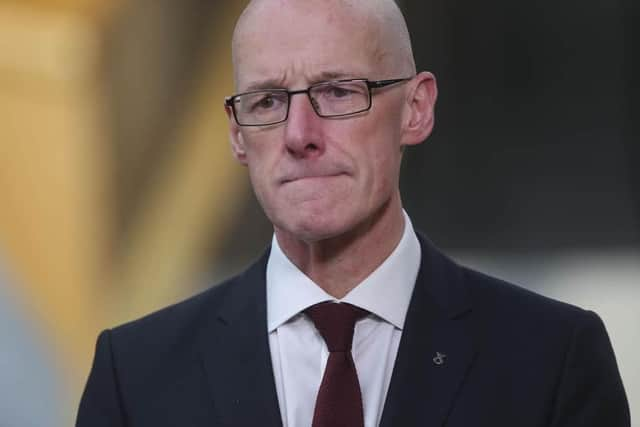More than £500m of spending cuts announced by Scottish Government
Deputy First Minister John Swinney warned the budget reductions are “just the beginning of the hard choices” that will need to be made.
He pointed to the impact of public sector pay rises, which are currently costing around £700 million more than anticipated, as well as support for Ukrainian refugees worth £200 million.
Advertisement
Hide AdAdvertisement
Hide AdMeanwhile, soaring inflation means the Scottish Government’s budget is now worth £1.7 billion less in real terms than it was last December.


Crippling council strikes were called off last week after an enhanced pay offer was made to local authority workers.
Mr Swinney said this meant a “significantly increased” pay rise for the lowest paid, but added: “Funding this agreement means taking money from elsewhere.”
In a gloomy update to the Scottish Parliament, he set out “reductions in planned spending and forecasting” totalling £560 million across a variety of areas including education, finance, culture, transport, rural affairs and local government.
This includes a £53 million reduction in employability schemes and a £37 million cut in the budget for concessionary fares, although the latter will not have an impact on eligibility. Instead, it is one of a number of savings that rely on a forecast reduction in demand.
Elsewhere, Scottish ministers will utilise £82 million in consequential funding as a result of the UK Government’s cost of living announcements from spring 2022.
Other savings will be made in areas including teacher training and educational maintenance allowance, as well as through “recruitment controls”.
Meanwhile, £120 million of “capital support” for local government will be identified through “reprioritisation”.
Advertisement
Hide AdAdvertisement
Hide AdA Government insider indicated more politically painful cuts are in the pipeline.
Mr Swinney said there “has never been a time of greater pressure on the public finances”, with the Scottish Budget at “the absolute limits of affordability”.
He said: “Throughout this process, we have taken those savings that we consider have the least impact on public services and on individuals.
"Still, these decisions have not been easy and they will not be without consequence – in particular, the reduction in employability funding.
"But given the circumstances we face, they are unavoidable.”
He added: “Further savings will be required to balance the budget, particularly if inflation continues to rise.
"The majority of our spend cannot be changed at this stage of the financial year. It is contractually committed or supports vital programmes.
"In short, what I have set out today is just the beginning of the hard choices.”
Advertisement
Hide AdAdvertisement
Hide AdNicola Sturgeon previously announced a rent freeze for tenants in the private and social rented sectors and a "moratorium on evictions" this winter.
The First Minister also said rail fares on ScotRail will be frozen until at least March 2023.
Mr Swinney said the Scottish Government is considering further action, including potentially freezing rail fares beyond March.
He added: “None of that can be done without reducing planned spend in other areas and on other programmes.
"Difficult choices must be made. There is no unallocated cash. There is no reserve that has not been utilised.
"Every penny more on one policy is a penny less on another policy.”
Mr Swinney has committed to setting out an emergency budget review within two weeks of the UK Government budget update expected later this month.
He said: "We will do everything we can. We will make the hard choices. But only the UK Government can act to end this crisis.
"They should do so – and I encourage them to do so now.”
Advertisement
Hide AdAdvertisement
Hide AdConservative MSP Miles Briggs attacked Mr Swinney for failing to target the £20 million earmarked for a second independence referendum next year.
“Talk about skewed, self-serving priorities,” he added.
“People up and down Scotland, who’ll bear the brunt, will rightly be furious that no matter how deep the cuts bite, the SNP will always safeguard spending on their pet obsession – a divisive constitutional vote that most Scots don’t even want.
“It’s also shamelessly predictable that the Deputy First Minister – like Nicola Sturgeon 24 hours earlier – continues to peddle the line that the SNP is providing £3 billion in support to help people cope with the cost-of-living crisis.
"Independent analysis has shown that less than one-sixth of this is new money, so ministers need to stop misleading hard-pressed Scots.”
Mr Swinney said his statement focused on spending for this financial year, whereas the money earmarked for another referendum “will be spent next year”.
Tory MSP Jeremy Balfour, who has a physical disability, said the reduction in employability spend will “affect the most vulnerable disabled people in our society” and called for a rethink.
Mr Swinney said he would “explore what opportunities there are” to address the issue, but added: “We are under severe financial pressure and to meet the cost of public sector pay, we have to take the decisions that we are taking.”
Labour MSP Daniel Johnson called for “greater clarity, honesty and transparency” over the Government’s choices.
Advertisement
Hide AdAdvertisement
Hide AdHe asked: “Can (Mr Swinney) set out what plans he’s asked civil servants to examine, and when he will confirm both when they will be put in place and the timelines for implementing them?”
The Deputy First Minister replied: “The budget process will go through the normal process of parliamentary scrutiny, and the ultimate budget revisions will go to the finance committee in due course.
Scottish Liberal Democrat MSP Willie Rennie said: “I think people deserve to know what the real impacts will be on rural communities, on trading funds, and of course, on employability schemes.”
Comments
Want to join the conversation? Please or to comment on this article.
